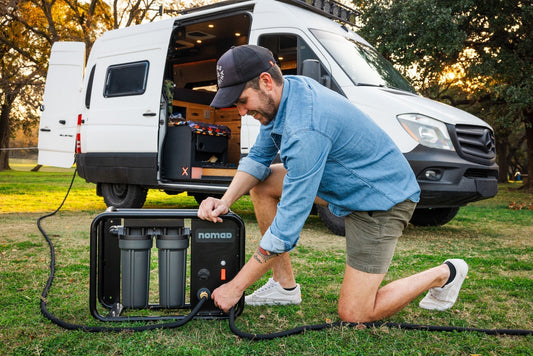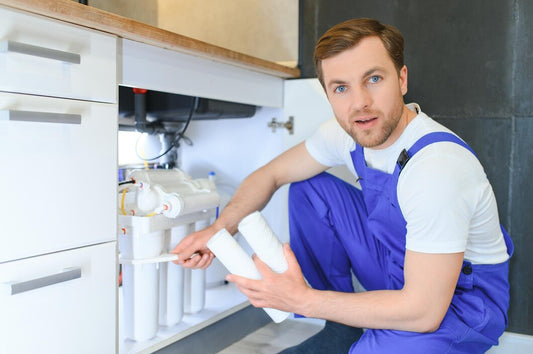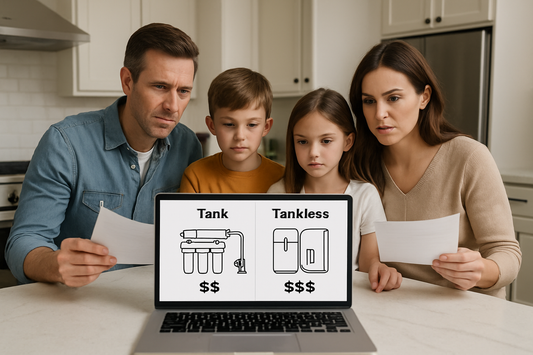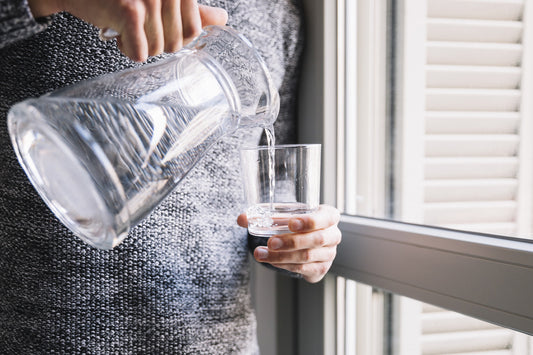Last winter, when the power grid failed across Texas, millions of families faced a harsh reality: their taps ran dry, and bottled water vanished from store shelves within hours. If you've ever wondered what you'd do if the same happened to your family, you're not alone. Home emergency water filtration isn't just about survival—it's about protecting the people you love most when everything else fails.
Why Your Home Needs Emergency Water Backup
Picture this: it's 6 PM on a Tuesday, and suddenly the lights go out. Your kids are hungry, your phone battery is dying, and then you turn the faucet—nothing. Or worse, murky water trickles out. During emergencies, municipal water systems often fail first, leaving families scrambling for safe drinking water.
The truth is, most American homes are completely unprepared for water emergencies. While we stock flashlights and batteries, we forget that clean water is our most critical need. Within just three days without proper hydration, your family's health becomes seriously compromised.
But here's the empowering part: with the right emergency water filtration system for home use, you can transform any water source into safe, clean drinking water for your family—even when the power's out and the stores are closed.
The Hidden Dangers in Emergency Water Sources
When disaster strikes, the water that does come from your taps might look clean but harbor invisible threats. During hurricanes, floods, and infrastructure failures, water treatment plants often lose power or become contaminated. Your "clean" tap water could suddenly contain:
Biological contaminants like E. coli, giardia, and cryptosporidium that cause severe digestive illness—the last thing you need during a crisis. Chemical contaminants including chlorine, lead, and agricultural runoff that can affect your family's health over time. Sediment and debris from damaged pipes and overwhelmed treatment systems.
Even if you have bottled water stored, it won't last forever. The average family of four needs at least one gallon per person per day—that's 28 gallons per week just for drinking. Storage space runs out fast, but contaminated water sources are everywhere.

Your Home's Emergency Water Action Plan
The key to water security isn't just having one filter—it's having a layered defense system that works no matter what type of emergency you face.
Layer 1: Clarification First
Before any filtration, always clarify questionable water sources. Use clean cloth, coffee filters, or simply let sediment settle. This simple step extends your filter's life and makes everything downstream more effective. During emergencies, every filter cartridge is precious.
Layer 2: Primary Filtration
This is where your main emergency water filter systems for home use come into play. Gravity-fed systems work perfectly during power outages, requiring no electricity while producing clean water for your entire family. These systems can process large quantities of water and typically remove 99.9% of harmful bacteria and parasites.
Layer 3: Final Purification
For maximum safety, especially with unknown water sources, a final purification step ensures your family drinks only the safest water possible. This might involve UV sterilization (battery-powered units work great) or simple boiling when fuel is available.
Emergency Water Filtration Systems That Actually Work
Whole House Emergency Systems
For families serious about preparedness, whole house emergency water filtration provides the ultimate peace of mind. These systems install directly into your home's water line and continue working even during power outages, automatically filtering every drop of water entering your home.
Crystal Quest whole house systems excel in emergency situations because they're designed for high-flow, high-capacity filtration without electricity. When municipal water becomes questionable, your entire home—every faucet, shower, and appliance—receives filtered water automatically.
Undersink Emergency Solutions
Your kitchen becomes command center during emergencies, making undersink emergency filtration incredibly valuable. These systems provide instant access to clean drinking and cooking water right where you need it most.
Waterdrop undersink systems offer excellent emergency backup because they're designed for consistent, high-quality filtration even with varying water pressure. During emergencies when water pressure drops, these systems continue producing clean water for your family's most critical needs.
Portable Emergency Backup
Every prepared home needs portable emergency water filters as the final backup. These compact systems work anywhere—whether you're filtering rainwater, pond water, or questionable tap water. They're perfect for filling cooking pots, emergency hydration, or when you need to leave your home temporarily.
Water filter bottles with built-in filtration serve as personal emergency systems for each family member. During evacuations or when you're away from home, these bottles ensure everyone has access to clean water no matter what sources you encounter.

Image by vershinin89
Choosing Your Family's Emergency System
For Budget-Conscious Families
Emergency preparedness doesn't require breaking the bank. Quality gravity-fed systems start around $100-200 and can provide years of emergency water security. Look for systems that filter at least 1-2 gallons per hour and remove both biological and chemical contaminants.
For Comprehensive Home Protection
Families wanting complete coverage should consider combining a whole house system with undersink backup and portable filters. This approach ensures clean water at every level—from showering and dishwashing to drinking and cooking.
For Apartment and Small Space Living
Limited space doesn't mean limited options. Countertop gravity systems require minimal storage space while providing excellent emergency capacity. Paired with portable filters, even small apartments can maintain water security during emergencies.
Real-World Emergency Scenarios
Power Outages
During extended blackouts, electric pumps fail but gravity systems continue working. Your family maintains access to clean water while neighbors struggle with contaminated sources or depleted bottled water supplies.
Natural Disasters
Hurricanes, floods, and earthquakes often contaminate municipal water supplies. Having home emergency water filtration means you can safely use available water sources while others wait for emergency services or supplies.
Infrastructure Failures
Aging water pipes, treatment plant failures, and contamination events happen more frequently than most people realize. Your emergency system becomes your primary water source until normal service resumes.
Maintenance: Keeping Your System Ready
Emergency water filtration systems require minimal maintenance, but preparedness means keeping them ready. Replace filters according to manufacturer schedules, test your system quarterly, and store replacement cartridges in a cool, dry place.
Mark your calendar for filter changes and system checks. During actual emergencies, you want your system working perfectly, not discovering expired filters or damaged components.

The Peace of Mind Investment
Investing in home emergency water filtration isn't just about disaster preparedness—it's about the confidence that comes with knowing your family is protected. When news reports show water shortages, contamination events, or infrastructure failures, you'll sleep better knowing your family has reliable access to clean, safe water.
The families who weathered recent disasters best were those who prepared ahead of time. They had systems in place, knew how to use them, and maintained their equipment properly. They didn't wait for emergencies to strike—they prepared while times were good.
Getting Started Today
Don't wait for the next disaster to think about water security. Start with a basic emergency system that fits your budget and living situation. You can always expand and upgrade as your needs grow and your preparedness knowledge increases.
Remember: the best emergency water filtration system is the one you have ready and working when you need it most. Your family's safety and health are worth that preparation.
FAQ
How much water should I filter during emergencies?
Plan for at least 1 gallon per person per day for drinking, cooking, and basic hygiene. A family of four needs minimum 4 gallons daily during emergencies.
Can emergency water filters work without electricity?
Yes, gravity-fed systems work perfectly during power outages. They use gravity to push water through filters, requiring no electricity or pumping.
How long do emergency water filters last?
Filter lifespan depends on usage and water quality. Most emergency filters process 1,000-6,000 gallons before replacement. Check manufacturer specifications for your specific system.
What water sources work with emergency filters?
Most emergency systems handle tap water, well water, and collected rainwater. Avoid salt water, chemically contaminated sources, or visibly polluted water unless you have specialized filters.
Should I combine multiple filtration methods?
Yes, layered filtration provides maximum safety. Use clarification first, then primary filtration, followed by final purification for unknown or highly contaminated sources.






